10 Unlikely Cherry Blossom Destinations in the U.S.
Did you know the biggest display of cherry blossoms in the U.S. is actually driving distance from New York City?
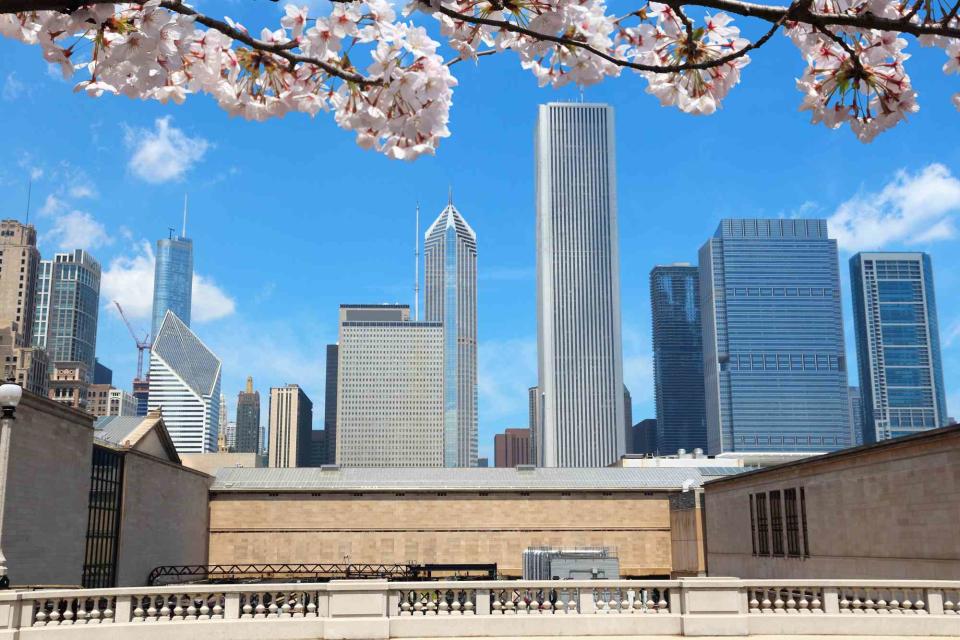
tupungato/Getty Images
Signaling spring’s arrival, the sudden flourish of cherry blossoms starting in — weather permitting — mid-March is such a special, fleeting moment in time. It’s so special, in fact, that it warrants its own viewing tradition in Japan. Over the last century, hanami (flower viewing) has taken root stateside due to the tens of thousands of sakura (flowering cherry trees) gifted to various American cities from Japan as a sign of peace and good fortune. While Washington, D.C., which received more than 3,000 sakura from Japan in 1912, is widely recognized as the premier U.S. city for an iconic hanami experience, other destinations around the country are certainly no slouches when it comes to sakura. For your viewing pleasure, here are 10 under-the-radar cities in the U.S. blooming with great hanami traditions.
University of Washington
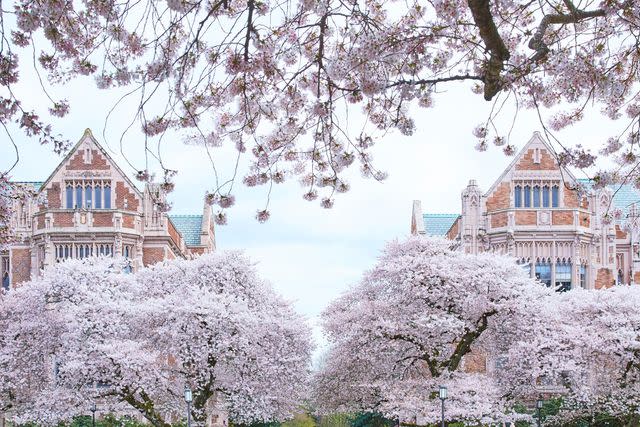
Kai Wang/Getty Images
By mid-March, the 29 Yoshino cherry trees planted on the University of Washington’s Liberal Arts Quadrangle will be efflorescing into pale-pink puffs, like giant botanical versions of cotton candy. Transplanted from the Washington Park Arboretum in 1961, this will be the 62nd year the Yoshino trees will put on their blush-worthy vanishing act. While sakura viewing is a city-wide event — the tradition started when Japan donated a forest’s-worth of trees to Seattle in the 1930s — the Quad is widely regarded as the most iconic spot for a springtime photo-op. Be warned: due to crowd convergence, staking out a picnic spot under the dreamy canopy may be tough. Embark instead on a two-mile loop hike that starts at the Quad and traverses less-explored spots like Drumheller Fountain and the century-old Shell House. You’ll be able to spot the extremely rare Hisakura flower scattered across the campus.
Macon, Georgia
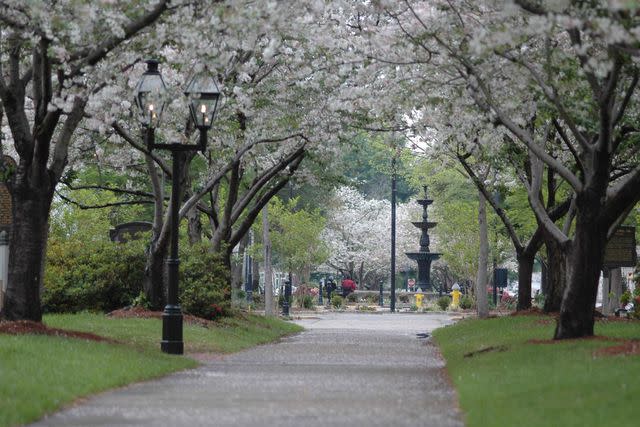
mstroz/Getty Images
The self-proclaimed “Cherry Blossom Capital of the World” is well-deserved considering more than 350,000 cherry trees have taken root in the city. In the early 1950s, realtor and amateur horticulturist William A. Fickling, Sr. began propagating Yoshinos in the city, planting more than 120,000 over his lifetime. This year, Macon’s 43rd annual International Cherry Blossom Festival, dubbed “The Pinkest Party on Earth,” will take place from March 17 through March 26, and includes a parade, an Elvis tribute, and a “Trash Can Trot” (yes, participants race while wearing trash cans) down Cherry Street. Can’t make it to Macon on short notice? See the blossoms on the city's live-feed BloomCam.
Nashville, Tennessee

John Cardasis/Getty Images
According to popular opinion, the seed for the Volunteer State’s love affair with cherry trees may have been planted in 1837 when President Andrew Jackson, a native Tennessean, sought to open trade between the U.S. and Japan. Still, Nashville only began its official blush in the 21st century, when the Japanese consulate general for the south-central U.S. moved his office from New Orleans to the Music City. He brought along 1,000 cherry trees, which have been celebrated during an annual Cherry Blossom festival since 2009. This year’s floriated festivities take place at Nashville Square on April 15, granting you temporary reprieve from your Tax Day woes. You can lace up for a 2.5-mile guided cherry blossom walk that includes a lap around the state capital.
St. Louis, Missouri

Jennifer Wu/Eye Em/Getty Images
Just when you think that architect Eero Saarinen’s monument, the 630-foot-tall Gateway Arch, couldn’t be any more awe-inspiring, springtime marches in and brings it new life. A profusion of posies cushions the iconic span. Hanami can also be enjoyed at the nearby Missouri Botanical Garden, which is more democratic about its flowering fruit trees, boasting more than 230 specimens from the genus Prunus, including peach, plums, and almonds, in addition to ornamental cherries. Of the latter, seek out the garden’s 40 weeping Higans, the dozen or so frilly Kanzans, and the 20 centennials — cut from trees gifted to Washington, D.C. from Japan in 1912 — for a different viewing experience than the typical all-Yoshino affair. What’s more, bees don’t have to be the only ones buzzing; join a “Sake and Sakura” event on April 7, which includes an expert-led sampling of the fermented-rice brew under the blossoms.
Boston, Massachusetts

tupungato/Getty Images
Sakura season in the northeastern U.S. can arrive up to six weeks later than the rest of the country, with full bloom typically timed for late April or early May. In Boston, most hanami-goers take to the Charles River Esplanade, by kayak or on foot, where more than 250 cherry trees create a fanciful Candyland-worthy canopy. (You can focus your visit on the 64-acre park by making a beeline for the Hatch Shell, a popular spot for a picnic underneath the posies.) Boston’s rosy tint doesn’t just come from the Esplanade, though. You can find cherry trees flanking brownstones in the Back Bay neighborhood, or at the Boston Public Garden, where the Kwanzan cultivar tree expresses its pageantry gene with deep-pink double blossoms, a light almond scent, and leaves that change color year-round. And at Harvard University’s botanical research center, the Arnold Arboretum, cherry blossoms aren’t just overhead, they cover the ground, too.
Philadelphia, Pennsylvania
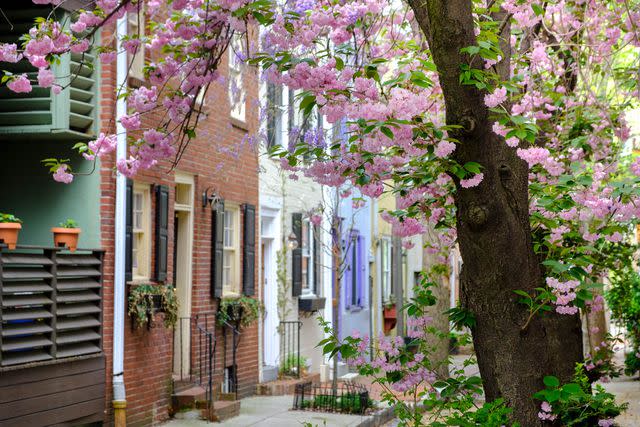
Jon Lovette/Getty Images
Visitors to the Subaru Cherry Blossom Festival of Greater Philadelphia, which will take place April 15 through April 16 at the Shofuso Japanese House and Garden, can usually take part in an evening viewing of illuminated cherry blossoms. In Japan, this tradition is called yozakura. Of the city’s 3,000 or so cherry trees, approximately half were gifted from Japan in 1926, and 100 specimens from that flowery inheritance still stand near Shofuso, just outside of the Fairmount Park Horticultural Center. The popular places to see pink pomp include the east side of the Schuylkill River, behind the Please Touch Museum, and at the Belmont Plateau in Fairmount Park, where you can get a view of the Philly skyline in the distance. Use this artistic map to plot your pursuit of cherry blossoms in the City of Brotherly Love.
Newark, New Jersey

Andy Kazie/Getty Images
Antihistamine alert! Since Branch Brook Park in Newark has the largest collection of cherry blossom trees in the U.S. — 5,200 pretty pollen diffusers condensed into a modest 360 acres — there’s bound to be as much sneezing as selfie-snapping going on during the annual Cherry Blossom Festival, taking place April 1 through April16. On the Venn diagram of Hanami Experiences for Allergy Sufferers, minimum exposure and maximum enjoyment meet at two points: The festival’s official “One Mile Fun Run” (April 15) through the park’s historic cherry orchards, and the Bloomwatch webcam. The live feed, which will likely start in late March as the blooms reach their peak, can be enjoyed from the comfort of your air-filtered home.
Portland, Oregon
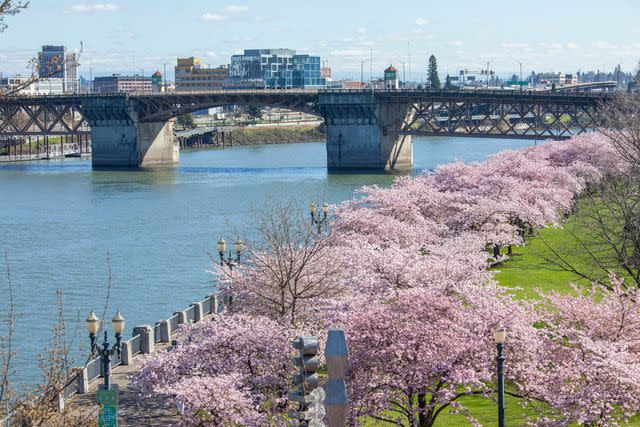
xiao zhou/Getty Images
For one week each year, the City of Roses turns its attention to an equally romantic citizen of the floral kingdom: the cherry blossom. While it seems logical to head to the Portland Japanese Garden for your hanami fix — the Flat Garden’s sinuous raked gravel and islands of clipped shrubbery make a picturesque setting for one theatrical weeping cherry tree — there are plenty of other scenic spots. At Tom McCall Waterfront Park, for instance, there are 100 Akebono cherry trees that line the riverside around the Japanese American Historical Plaza — with the muscular steel span known as the Burnside Bridge as a backdrop, many Portlanders regard this as the premier place for a posy spectacular. That said, at the Hoyt Arboretum, you’ll not only see cherry blossoms, but also encounter a bonus blush from other April bloomers like magnolia, buttercup winter hazel, and Tweedy Red, a rare flower native to the Pacific Northwest.
Traverse City, Michigan
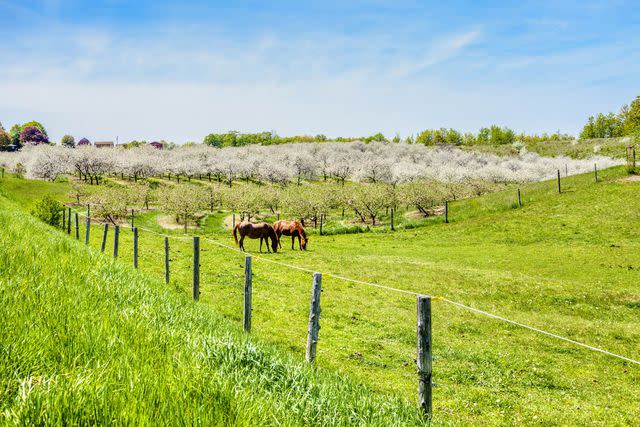
Gary Ennis/Getty Images
Since Northern Michigan is widely regarded as the best place in the world to grow cherries, it stands to reason that there are — cue understatement of the year — a lot of cherry trees that bloom around those parts. Just motoring along Highway M-37 by Grand Traverse Bay in Traverse City will take you through more than 2 million trees. (No wonder Traverse City calls itself the “Cherry Capital of the World,” the agricultural epicenter of a five-county region that produces up to 120 million pounds of tart cherries each year, roughly half of the domestic crop.) For a wine-fueled hanami experience, head to County Road 633 on the Leelanau Peninsula, where you’re not only in the heart of cherry-growing country, but also the Traverse Wine Coast — boutique wineries interspersed with flourishing cherry orchards should make for a day trip to remember.
Chicago, Illinois
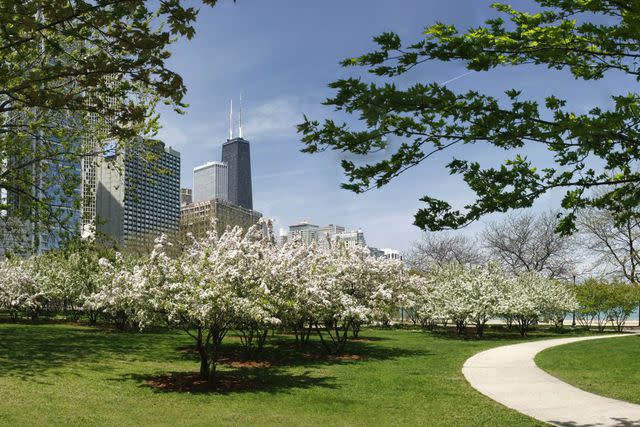
christopherarndt/Getty Images
The neoclassical architecture of the Museum of Science and Industry in Chicago can appear mausoleum-like under the gray skies responsible for those proverbial April showers. But when the sakura planted along the Columbia Basin just south of the museum start revealing their fanciful pink canopies (mid-April to early May), the gravitas of the historic building — the former Palace of Fine Arts from the 1893 World’s Columbian Exposition — is considerably brightened. More than 160 cherry trees — varieties include Yoshino, Gooseberry, and weeping Snow Fountains — festoon this area of Jackson Park, but there are more if you head south toward the Garden of the Phoenix, a historic Japanese oasis. Get ready to wait in a long queue during hanami season. Those 120 cherry trees planted in 2013 to celebrate the garden’s 120-year anniversary conjure a greater feeling of Zen in proximity to koi ponds, rock gardens, Japanese maple trees, and one lotus blossom sculpture called “Skylanding.” The installation features a dozen 12-foot-tall stainless-steel lotus petals, a portrayal of peace by artist Yoko Ono.
For more Travel & Leisure news, make sure to sign up for our newsletter!
Read the original article on Travel & Leisure.